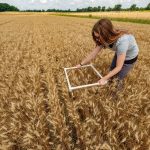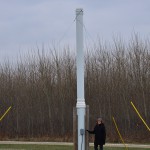Despite the environmental benefits of no-till agriculture, farmers often hesitate to change to this management approach due to uncertain economic returns. Sarah Cusser, postdoctoral research associate at the Kellogg Biological Station (KBS), and MSU terrestrial ecologist Nick Haddad, director of the Long-term Ecological Research (LTER) program at the Kellogg Biological Station (KBS) and professor in the Department of Integrative Biology, however, have just published a study in Global Change Biology that clearly demonstrates significant benefit
Insect vacuum on the KBS LTER helps serve as an early warning system
By Bill Krasean, retired journalist and KBS LTER volunteer Every Friday mid-May through mid-October, a staff member at Kellogg Biological Station (KBS) Long-term Ecological Research (LTER) program drives to a tall, narrow pipe on the main experiment site, opens a small door at the base of the tower and extracts a bottle filled with liquid and a cornucopia of insects. The little critters, victims of a strong suction at the top of the pole as they fly by, are shipped to the University of Illinois where Dr. David J. Voegtlin and Dr. Doris Lagos, experts in the identification of aphids,

